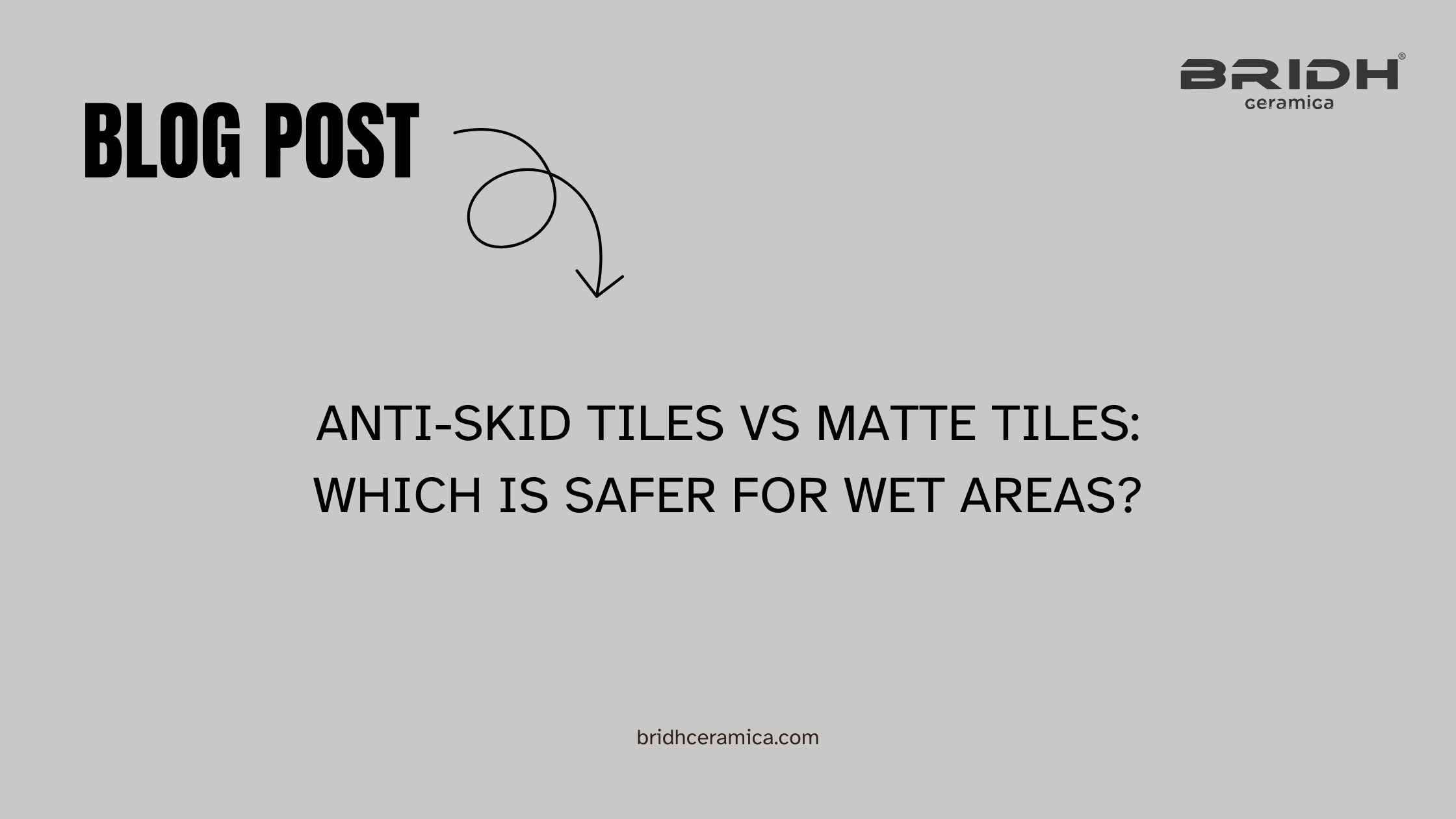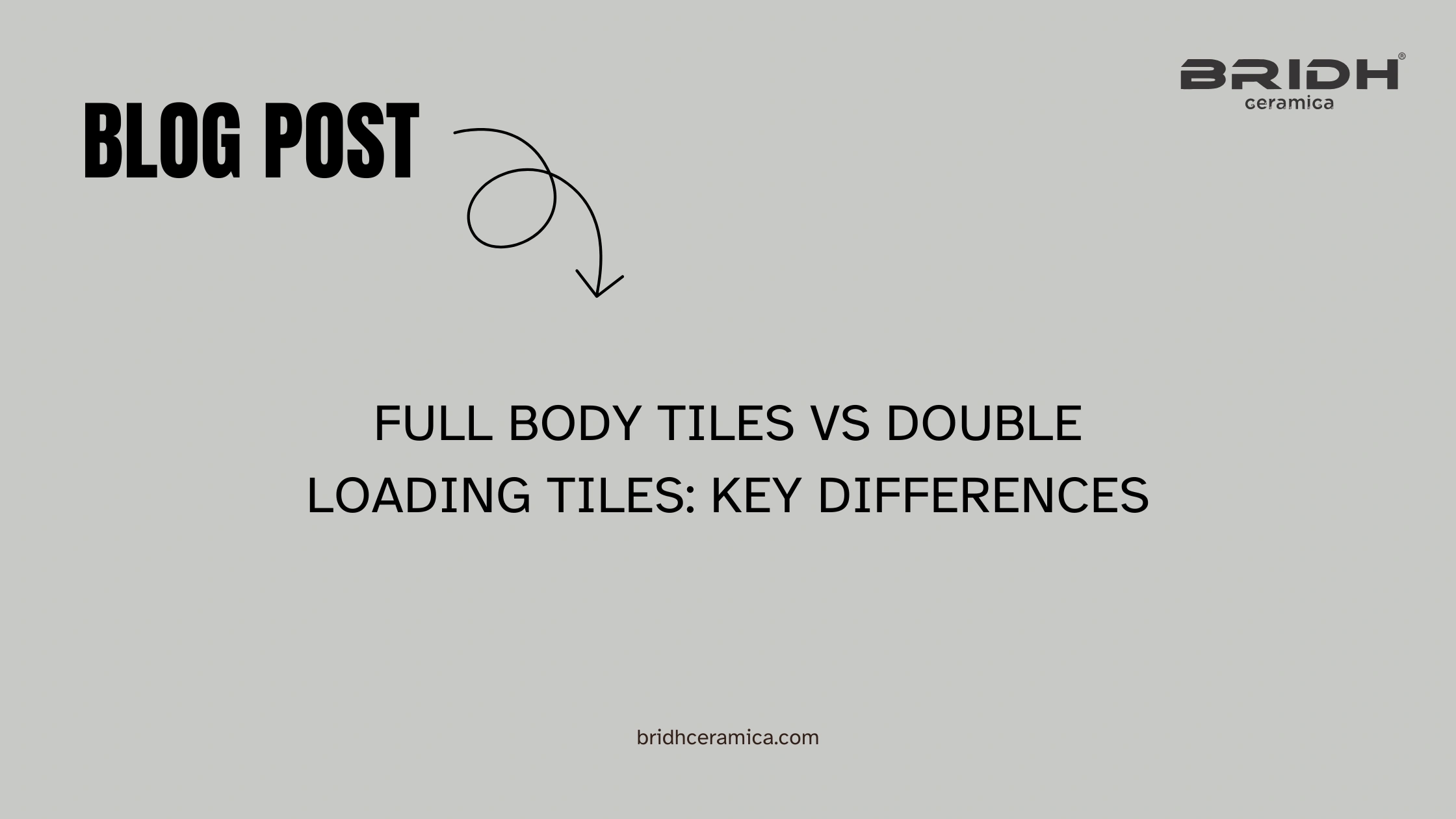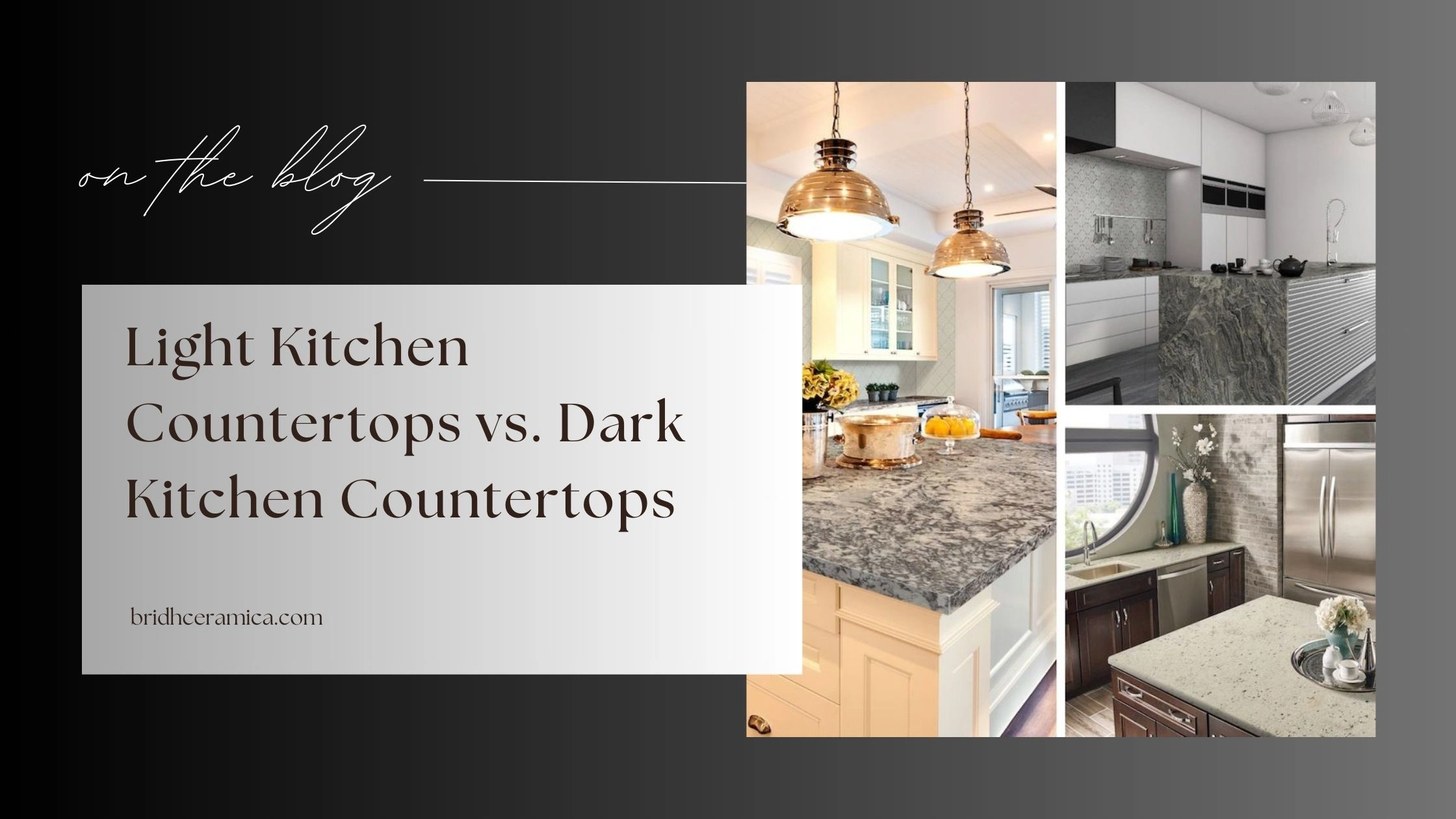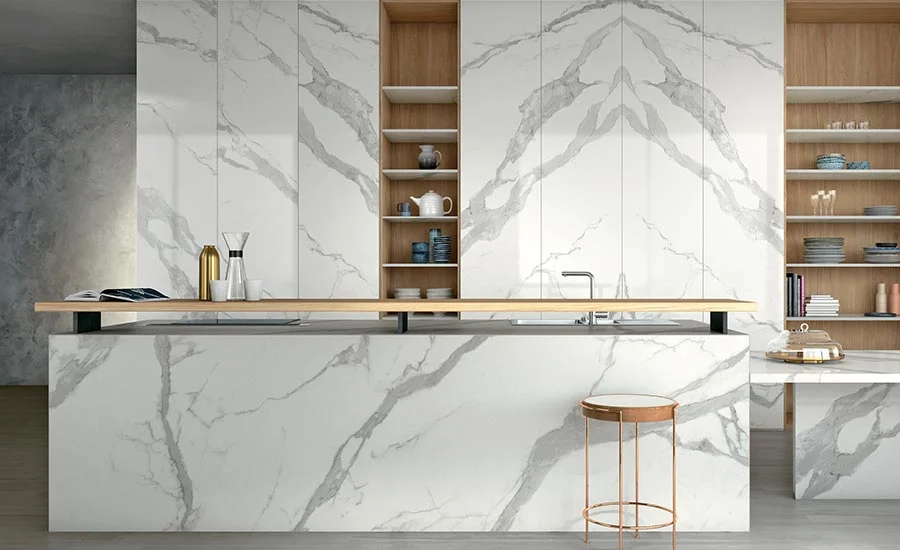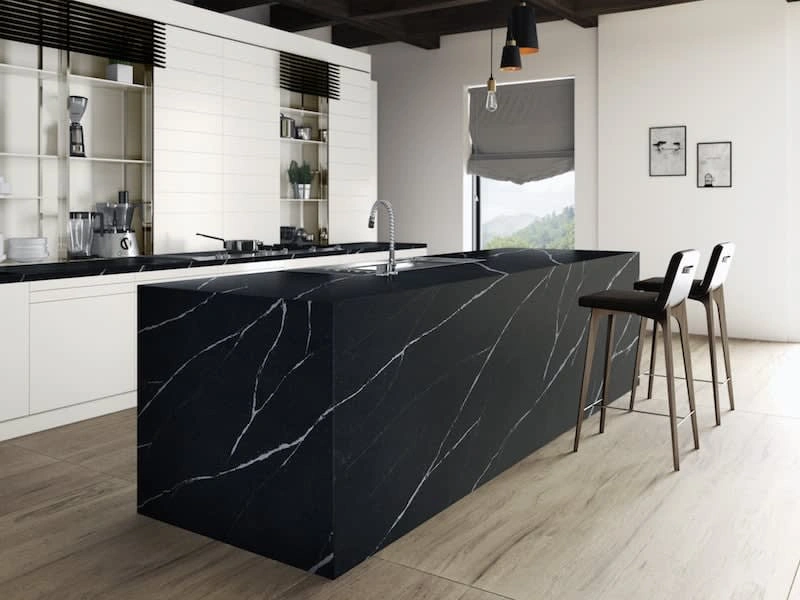Anti-Skid Tiles vs Matte Tiles: Which Is Safer for Wet Areas?
Feb 04, 2026Connect With Our Team
While making plans for your kitchen renovation, one simple decision can make a difference: light kitchen countertops vs. dark kitchen countertops. Light countertops come in white or cream color and, compared with other kinds of kitchen countertops, make a room appear to be brighter than it would if it were otherwise. Dark kitchen countertops, being charcoal or black, seem to add drama and warmth to your place.
This article will guide you through the pros and cons of light countertops vs. dark countertops so that you can decide where your needs lie for designing your kitchen. Be it the porcelain slab option or something else, let's know what is there to know in this regard to get your dream kitchen.
1. Light Kitchen Countertops
Definition and Examples
The most popular materials used are quartz, marble, and granite. These colors are popularly known for their wide pairing opportunities with other designs found in kitchens. These are available in the following shades: white, cream, and beige.
Aesthetic Benefits
Brightening a Space: reflective light, bright countertops alone can make a small kitchen appear larger and more spacious.
Creating an Illusion of Space: These countertops reflect both natural and artificial lighting, so it creates space in a room; this makes it airy in any kitchen.
Pros of Light Countertops
Enhancing Natural Light in Smaller Kitchens: Light countertops amplify the effects of natural light. This way, small kitchens do not look cramped.
Complementing Different Design Styles and Themes: Match any design style and theme. Because of the flexibility in light-colored options, they can easily go along with a variety of design styles, modern, minimalist, rustic farmhouse, and many more. They are gentle on cabinet and flooring selections.
Cons of Light Countertops
Challenges with Stains and Marks: If you choose light-colored kitchen countertops, you should be aware that they reveal stains, spills, and scratches very easily. You will need to clean them pretty much regularly if you want them to look their best.
Material-Specific Issues: Marble is porous and needs sealing if you don't want stains. Granite also must periodically be sealed to make its appearance and durability last.
Light Kitchen Counters Kitchen counters come in a variety of colors. Choosing light kitchen countertops has their aesthetic advantages balanced against the realities of maintenance. These surfaces can work wonders for a kitchen but may require just a low maintenance than their darker counterparts.
2. Dark Kitchen Countertops
Dark kitchen countertops, whether charcoal, brown, or black-colored, are an intrinsically classy touch in any kitchen design. The material used to fashion these surfaces can be any, which includes granite, reclaimed wood, or concrete, and they all bring along different textures and finishes.
Aesthetic Appeal
Drama and Warmth: A dark kitchen countertop can add drama and warmth to a space, so great for making the ultimate statement.
Cozy Atmosphere: Dark countertops in large kitchens create a feeling of coziness and warmth through the absorption of light. It also helps minimize the vastness.
Variety of Materials
Granite: Granite is a very hard stone with unmatched classic appeal. Dark colors serve as a robust and timeless option. It offers natural patterns and veining as a characterization of the countertop surface. It is not just aesthetically pleasing; it is a functional choice for kitchen surfaces.
Reclaimed Wood: This green option brings a rich texture and warm tones into your kitchen. It is perfect for a rustic or industrial-style kitchen. Because every piece of reclaimed wood is unique, it gives your kitchen that individuality.
Concrete: With its modern, industrial look, concrete countertops can be mixed up with many different pigments and finishes. This material is extremely tough, yet it needs to be sealed in order not to stain.
Pros of Dark Kitchen Countertops
Hides Stains: Dark-colored surfaces will probably hide stains better than their light counterparts, meaning fewer visible marks.
Versatility in Design: They complement a variety of cabinet colors and designs, from modern sleekness to more conservative designs.
Cons of Dark Kitchen Countertops
Shows Dust and Water Marks: While not stained easily, dark countertops display dust, water spots, and fingerprints far more readily than lighter countertop options.
Lighting Considerations: In this regard, since these surfaces can only absorb light and cannot reflect it, proper task lighting can make all the difference between this space remaining functional and remaining aesthetically pleasing.
Dark kitchen countertops create that dramatic effect but a very big practical question centers on maintenance and lighting. Whether you have an elegant design or want an atmosphere that is cozy, dark countertops can really help you achieve a kitchen aesthetic.
Key Considerations When Choosing Between Light and Dark Countertops
Choosing the correct countertop color is essential and basing it on several critical considerations. Perhaps the most important factor is the size of your kitchen, as this can greatly determine what countertop you opt for.
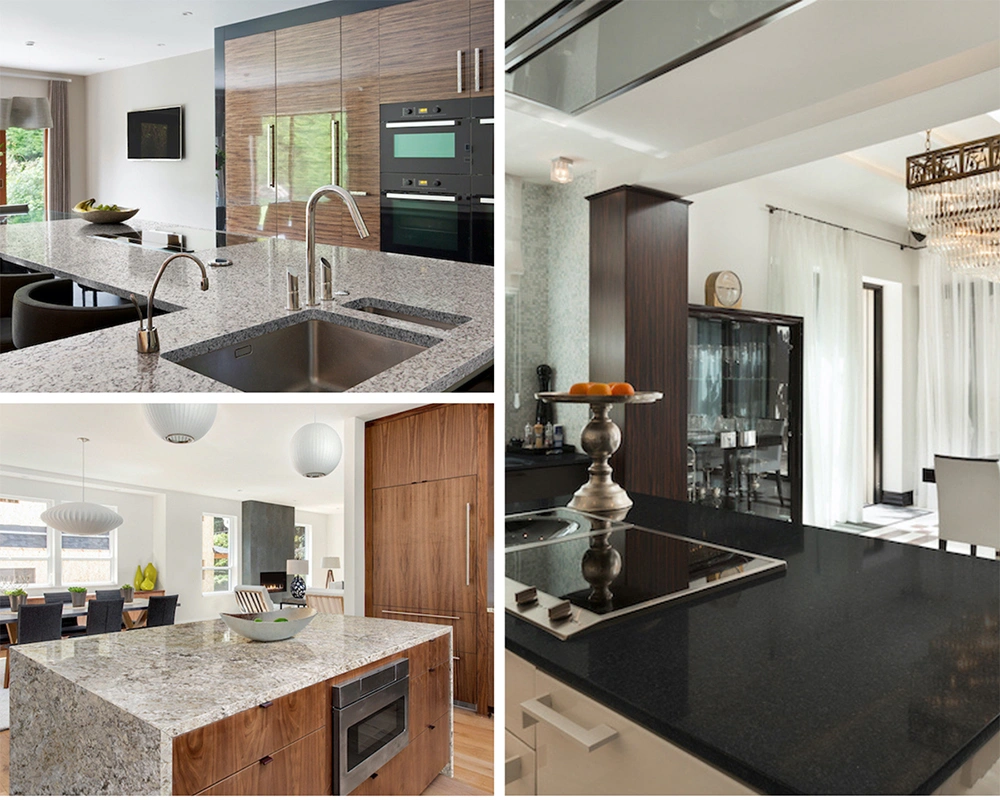
Kitchen Size Impact on Countertop Choice
Small Kitchens
For smaller spaces, light tops such as white, cream, or beige make it appear much bigger. These colors reflect well with light and create the illusion of openness. In combination with the best colors for small kitchen cabinets, they can contribute to the overall roominess of the room.
Large Kitchens
Conversely, dark countertop pieces can be used to warm expansive spaces. Shades of charcoal, brown, or black would absorb the light and create a sense of enclosure. The cabinetry should also balance out the darker countertop for the aesthetic harmonization.
Natural Light Consideration for Countertop Selection
Natural light is one of the essential factors when one decides on a countertop. It influences the tone and performance of the countertop:
Ample Natural Light
If natural light is plentiful in your kitchen, dark countertops can be managed with rich tones becoming rich and inviting. Light fights against the darkness, meaning that space will not feel too confined.
Limited Natural Light
Kitchens with limited natural light have a pretty great possibility when using light-colored countertops because they brighten up the space. In reflecting all the light possible, it makes the room appear more spacious in terms of visibility. To maximize this, white walls would make even better sense.
Knowing these key aspects will enable you to determine whether it is appropriate for your kitchen to have light kitchen countertops or dark kitchen countertops.
Personal Style Preferences in Countertop Selection
As for the light or dark kitchen countertops, you must choose the advantage each could give you in respect to the overall design and functionality of your kitchen. The light countertop brings you a brighter and more open atmosphere, creating even smaller rooms feel larger and minor scratches and stains being hidden easily. Darker countertops, however, come with a bold, luxurious aesthetic, provide striking contrast in lighter spaces, and are less likely to show wear with heavy use. Ultimately, it becomes a matter of personal taste, size, and how much maintenance you are willing to commit to.
At Bridh Ceramica, we have the widest range of countertop options, such that you will certainly find one that goes perfectly well with your kitchen vision.
FAQs (Frequently Asked Questions)
1. What are light kitchen countertops?
Light kitchen countertops refer to surfaces that are typically white, cream, or beige. They are known for their aesthetic benefits, such as brightening a space and creating an illusion of more space.
2. What are the pros and cons of light kitchen countertops?
Pros include enhancing natural light in smaller kitchens and complementing various design styles. However, they can be challenging with stains and marks, requiring regular cleaning, and some materials may need sealing or special care.
3. What are dark kitchen countertops?
Dark kitchen countertops include surfaces like charcoal, brown, or black. They add drama and warmth to kitchen designs and can create a cozy atmosphere in larger kitchens.
4. What should I consider when choosing between light and dark countertops?
Key considerations include the size of your kitchen and the amount of natural light available. Light countertops can enhance smaller spaces, while dark countertops may work better in larger areas with sufficient lighting.
5. How do personal style preferences influence countertop selection?
Personal style plays a significant role in countertop selection. Your choice between light or dark surfaces should reflect your aesthetic preferences, whether you prefer a bright, airy feel or a dramatic, cozy atmosphere.
6. What materials are available for dark kitchen countertops?
There is a variety of materials available for dark kitchen countertops, including granite, reclaimed wood, and concrete. Each material offers unique aesthetic qualities and durability.
Whatsapp Chatx
Hi! Click one of our representatives below to chat on WhatsApp or send us email to dhaval@bridhceramica.com

|
************** +91 97023 82809 |
 TILES VIEW
TILES VIEW
